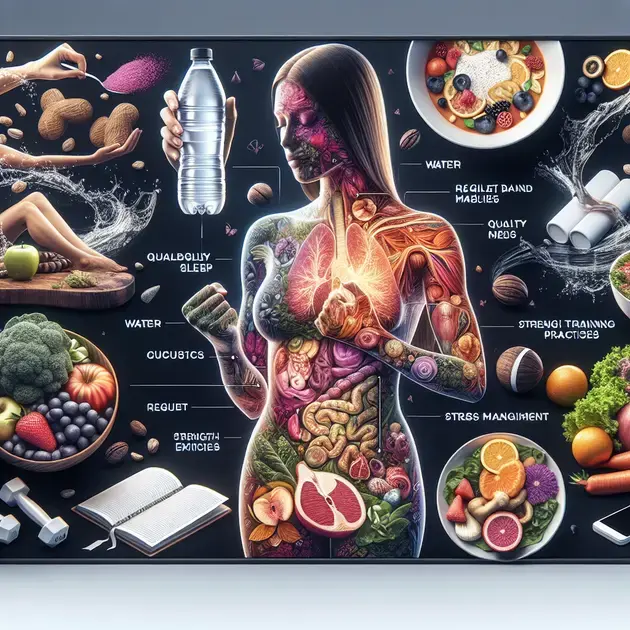Are you looking to boost your metabolism naturally? In this comprehensive guide for women, we will explore effective and scientifically proven ways to enhance your metabolism and achieve your health goals.
With the latest research suggesting that incorporating certain foods and lifestyle habits can significantly increase metabolic rate, it’s time to take control of your metabolism and discover the strategies that work best for women.

Boost Your Metabolism with These Simple Lifestyle Changes
Boosting your metabolism is key to maintaining a healthy weight and overall wellbeing. Making simple lifestyle changes can have a significant impact on how efficiently your body burns calories. Here are some easy steps to rev up your metabolism:
1. Stay Hydrated
Drinking plenty of water is essential for a fast metabolism. Dehydration can slow down your body’s calorie-burning process. Try apps like WaterMinder or MyFitnessPal to track your water intake and stay hydrated throughout the day.
2. Get Sufficient Sleep
Aim for 7-9 hours of quality sleep per night to keep your metabolism running smoothly. Lack of sleep can disrupt your hormone levels and lead to weight gain. Use the Sleep Cycle or Calm app to improve your sleep habits and ensure you’re getting enough rest.
3. Eat Regularly
Avoid skipping meals and aim to eat small, balanced meals every 3-4 hours. This helps maintain stable blood sugar levels and prevents your metabolism from slowing down. Apps like MyPlate or MyFitnessPal can help you keep track of your meals and snacks.
4. Incorporate Strength Training
Adding strength training exercises to your workout routine can boost your metabolism by building lean muscle mass. Apps like Nike Training Club or Fitbod provide guided workouts to help you get started with strength training at home or in the gym.
5. Manage Stress Levels
Chronic stress can negatively impact your metabolism. Practice stress-reducing activities such as yoga, meditation, or deep breathing exercises. Use apps like Headspace or Calm to incorporate mindfulness practices into your daily routine and lower stress levels.
The Top Metabolism-Boosting Foods Every Woman Should Know
Choosing the right foods can significantly impact your metabolism and energy levels. Incorporate these metabolism-boosting foods into your diet for optimal results:
1. Lean Protein
Protein-rich foods like chicken, fish, tofu, and legumes require more energy to digest, which can help increase your metabolism. Use apps like MyFitnessPal or Lose It! to track your protein intake and ensure you’re meeting your daily goals.
2. Spicy Foods
Adding spices like chili peppers, cayenne pepper, or ginger to your meals can temporarily boost your metabolism and increase calorie burning. Explore recipes on websites like Allrecipes or Food Network for delicious spicy meal ideas.
3. Green Tea
Green tea contains antioxidants and catechins that can help increase metabolism and promote fat burning. Enjoy a cup of green tea daily or try green tea extract supplements for an extra metabolism boost. Look for green tea options on the Amazon or iHerb app.
4. Whole Grains
Fiber-rich whole grains like quinoa, brown rice, and oats can help regulate blood sugar levels and keep your metabolism steady. Use the Whole Foods Market or Thrive Market app to order quality whole grains for your pantry.
5. Omega-3 Fatty Acids
Foods rich in omega-3 fatty acids, such as salmon, walnuts, and chia seeds, can help reduce inflammation and support a healthy metabolism. Incorporate these foods into your diet for added nutritional benefits. Find omega-3 rich products on the Vitacost or Walgreens app.
Unlocking the Power of Exercise to Enhance Your Metabolism
Exercise plays a crucial role in boosting your metabolism and achieving your fitness goals. Here’s how you can harness the power of exercise to enhance your metabolic rate:
1. High-Intensity Interval Training (HIIT)
HIIT workouts involve short bursts of intense exercise followed by brief periods of rest or low-intensity activity. This type of training can help increase your metabolism and burn more calories in less time. Try the 7 Minute Workout or Nike Training Club app for HIIT workout routines.
2. Cardiovascular Exercise
Aerobic exercises like running, cycling, or swimming can help elevate your heart rate and boost your metabolism during and after your workout. Use apps like Strava or Runtastic to track your cardio sessions and monitor your progress.
3. Strength Training
Incorporating strength training exercises into your routine can increase muscle mass, which in turn boosts your metabolism. Focus on compound movements like squats, deadlifts, and presses for maximum effectiveness. Check out workout plans on the Fitbod or JEFIT app for strength training guidance.
4. Functional Training
Functional exercises mimic everyday movements and can help improve your overall strength, flexibility, and balance. Include exercises like lunges, planks, and kettlebell swings in your workout regimen. Learn new functional exercises through the Daily Workouts Fitness Trainer app or Sworkit.
5. Active Lifestyle
Incorporate more movement into your daily life by taking the stairs, walking instead of driving short distances, or engaging in recreational activities like dancing or hiking. Stay motivated and track your daily steps with the Fitbit or Garmin Connect app for an active lifestyle boost.

Unlocking the Secrets to a Faster Metabolism
Unlocking the secrets to a faster metabolism is crucial for overall health and weight management. One effective way to boost your metabolism is by engaging in regular physical activity. Whether it’s through cardio exercises like running or cycling, or strength training with weights, exercise can help increase your metabolic rate and burn more calories throughout the day. Additionally, incorporating high-intensity interval training (HIIT) into your routine can provide an extra metabolism boost.
Another important factor in speeding up your metabolism is maintaining a balanced diet. Eating a variety of nutrient-dense foods, such as lean proteins, fruits, vegetables, and whole grains, can support a healthy metabolism. Some foods, like green tea and spicy peppers, contain compounds that can temporarily increase metabolism, known as thermogenic effects.
Hydration is also key to unlocking a faster metabolism. Drinking an adequate amount of water throughout the day can help your body function optimally and support metabolic processes. Dehydration can slow down metabolism, so staying hydrated is essential for overall health and metabolism efficiency.
Quality sleep plays a significant role in metabolism as well. Lack of sleep can disrupt hormonal balance and lead to a slower metabolic rate. Aim for 7-9 hours of quality sleep each night to support a healthy metabolism and overall well-being. Prioritizing good sleep habits, such as maintaining a consistent sleep schedule and creating a restful sleep environment, can positively impact your metabolism.
Effective Stress Management Techniques for Boosting Metabolism
Managing stress is vital for boosting metabolism and promoting overall health. Chronic stress can lead to hormonal imbalances that impact metabolism, making it more challenging to maintain a healthy weight. One effective stress management technique is regular exercise, which can help reduce stress levels and increase metabolism.
Practicing mindfulness and relaxation techniques, such as meditation or deep breathing exercises, can also support stress management and metabolism. These techniques promote relaxation responses in the body, reducing stress hormones and supporting a healthy metabolic rate.
Prioritizing self-care activities like spending time in nature, engaging in hobbies, or socializing with loved ones can help reduce stress levels and support a balanced metabolism. Building a strong support network of friends and family can provide emotional support during stressful times, which can positively impact metabolism.
Getting professional help, such as therapy or counseling, can be beneficial for managing chronic stress and its impact on metabolism. Seeking support from a mental health professional can provide coping strategies and tools to better handle stress and promote a healthy metabolism.
How Quality Sleep Can Impact Your Metabolism
Quality sleep is essential for supporting a healthy metabolism and overall well-being. During sleep, the body performs crucial functions that regulate metabolism, including hormone production and cellular repair. Disrupted or inadequate sleep can disrupt these processes and lead to metabolic imbalances.
Consistent sleep patterns, such as going to bed and waking up at the same time each day, can support a healthy metabolism. This helps regulate the body’s internal clock, known as the circadian rhythm, which influences metabolic processes. Creating a bedtime routine that promotes relaxation, such as reading a book or taking a warm bath, can improve sleep quality and enhance metabolism.
Avoiding stimulants like caffeine and electronic devices before bedtime can support quality sleep and metabolic function. These factors can disrupt sleep patterns and inhibit the body’s ability to rest and repair during the night, impacting metabolism negatively. Creating a dark, quiet, and cool sleep environment can also promote better sleep quality and metabolic health.
Regular exercise can also enhance sleep quality and support a healthy metabolism. Engaging in physical activity during the day can help regulate sleep-wake cycles and promote restful sleep at night. However, it’s essential to avoid vigorous exercise close to bedtime, as it may energize the body and make it harder to fall asleep.
Conclusion
In conclusion, unlocking the secrets to a faster metabolism is essential for overall health and weight management. Engaging in regular physical activity, maintaining a balanced diet, staying hydrated, and prioritizing quality sleep are key factors in boosting metabolism. Exercise, such as cardio and strength training, can increase metabolic rate and burn calories effectively. Incorporating high-intensity interval training (HIIT) can provide an additional metabolism boost.
Effective stress management techniques are crucial for promoting a healthy metabolism. Regular exercise, mindfulness practices like meditation, and self-care activities help reduce stress levels and support a balanced metabolism. Building a strong support network and seeking professional help when needed can also positively impact stress and metabolism.
Quality sleep plays a significant role in regulating metabolism. Establishing consistent sleep patterns, creating a relaxing bedtime routine, and avoiding stimulants before sleep can enhance sleep quality and metabolic function. Additionally, engaging in regular physical activity during the day can promote restful sleep and support a healthy metabolism.